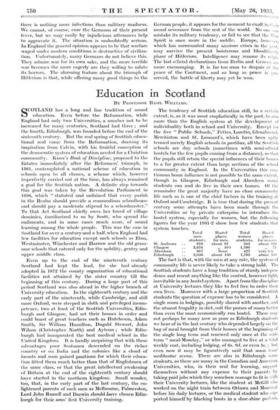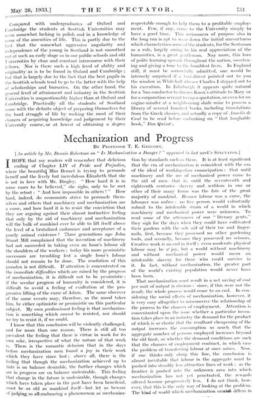Education in Scotland
By PROFESSOR
BASIL WILLIAMS.
SCOTLAND has a long and fine tradition of sound education. Even before the Reformation, while England had only two Universities, a number not to be increased for many centuries, Scotland had three ; and the fourth, Edinburgh, was founded before the end of the sixteenth century. But the real spring of Scottish educa- tional zeal came from the Reformation, drawing its inspiration from Calvin, with his fruitful conception of the democratic system of education needed for a-Christian community. Knox's Book of Discipline, proposed to the Estates immediately after the Reformers' triumph, in 1561, contemplated a national scheme of education in schools open to all classes; a scheme which, however imperfectly carried out at the time, has always remained a goal for the Scottish nation. A definite step towards this goal was taken by the Revolution Parliament in 1696, which " statuted and ordained that every parish in the Realm should provide a commodious schoolhouse and should pay a moderate stipend to a schoolmaster." To that Act Scotland chiefly owes her breed of village dominies, familiarized to us by Scott, who spread the rudiments, and in some cases much more, of sound learning among the whole people. This was the case in Scotland for over a century and a half, when England had few facilities for education except such schools as Eton, Westminster, Winchester and Harrow and the old gram- mar schools that catered only for the nobility, gentry and upper middle class.
Even up to the end of the nineteenth century Scotland -had kept the lead, for she had already adopted in 1872 the county organization of educational facilities not attained by the sister country till the beginning of this century. During a large part of this period Scotland was also ahead in the higher branch of University education. In the eighteenth century and the early part of the nineteenth, while Cambridge, and still more Oxford, were steeped in sloth and privileged incom- petence, two at least of the Scottish Universities, Edin- burgh and Glasgow, had set. their houses in order and could boast of great teachers such as Hutcheson, Adam Smith, Sir William Hamilton, Dugald Stewart, John Wilson (Christopher North) and Aytoun ; while Edin- burgh had inaugurated the best medical school in the United Kingdom. It is hardly surprising that with these advantages poor Scotsmen descended on the richer country or on India and the colonies like a cloud of locusts and soon gained positions for which their educa- tion fitted them much better than that of Englishmen of the same class, or that the great. intellectual awakening of Britain at the end of the eighteenth century should have started in the northern kingdom. Small wonder, too, that, in the early part of the last century, the en- lightened parents of such men as Melbourne, Palmerston, Lord John Russell and D8,7411 shotild.4ave chosen Edin, burgh for their_sons' first University training. The tendency of Scottish education still, to a certain extent, is, as it was most emphatically in the past, to aim more than the English system at the development of individuality both in school and University. Except for the five " Public Schools," Fettes, Loretto, Glenahnotl, Merchiston and St. Leonard's, which have been aptly termed-merely English schools-in partibus, all the.Scottish schools are day schools (sometimes with semi-official hostels for the few pupils coming from a distance), so that the pupils still retain the special influences of their homes to a far greater extent than large sections of the school community in England. In the Universities this con- tinuous home influence is not possible to the same extent, though in Glasgow, Edinburgh and Aberdeen many students can and do live in their own homes. Of the remainder the great majority have no close community life such as is one of the chief factors in the training at Oxford and Cambridge. It is true that during the present century some attempts have been made through the Universities or by private enterprise to introduce the hostel system, especially for women, but the following figures for the year 1931-2 show how few students that system touches.
Total Hostel Total Hostel men places women places students. for men. students. for women.
St. Andrews .. 616 about 91 343 about 1:30 Glasgow .. 3,976 ,, 10) 1,590
71
Aberdeen 887 None 427 'very few Edinburgh .. 3,046. about 150 1,195 about 350 The fact is that, with the men at any rate, the system of community life is never likely to take a strong hold. The Scottish students have a long tradition of sturdy indepen- dence and resent anything like the control, however light, inevitable in any hostel system. Apart from the discipline at University lectures they like to feel free to order their own lives. Moreover with a large proportion of Scottish students the question of expense has to be considered. A single room in lodgings, possibly shared with another, and the utmost frugality in diet, suit the purses of many better than even the most economically run hostel. There may not perhaps be many now as poor as Edinburgh students we hear of in the last century who depended largely on the bag of meal brought from their homes at the beginning of the single long term and renewed only once- at the mid- term " meal-Monday," or. who managed to live at a total weekly cost, including lodging, of Os. 9d. or even as. ; but even now it may be figuratively said that some kiwi meditantur avena. There are also in Edinburgh some students, as there are many in the Canadian and American Universities, who, in their zeal for learning, support themselves without' any expense to their parents by taking paid jobs which they somehow manage to fit in with their University lectures, like the student at McGill who worked on the night train between 'Ottawa and Montreal before his daily lectures, or the medical student who sup- ported himself by blacking boots 'in a shoe-shine parlour, Compared with undergraduates of Oxford and Cambridge: the -students at Scottish Universities may seem somewhat lacking in polish and in a knowledge of some of.the .amenities of life. This is partly due to the fact that the somewhat aggressive angularity and independence .of the young in Scotland is not smoothed out at such an early stage as in our public schools and old Universities by close and constant intercourse with their flows. Nor is there such a high level of ability and originality as is to be found in Oxford and Cambridge ; but that is largely due to the fact that the best pupils in the Scottish schools tend to go to the latter with the help of scholarships and bursaries. On the other hand, the general level of attainment and industry in the Scottish Universities is unquestionably higher than at Oxford and Cambridge. Practically all the students of Scotland come with the definite object of preparing themselves for the hard struggle of life by making the most of their chances of acquiring knowledge and judgement by their University course, or at lowest of obtaining a degree respectable enough to help them to a profitable employ- ment. Few, if any, conic to the University simply to have a good time. This seriousness of purpose also in the long run is apt to wear down the initial uncouthness which characterizes some or the students, for the Scotsman as a rule, largely owing to his real appreciation of the humanities, is a great gentleman. Nay more, this love of polite learning spreads throughout the nation, sweeten- ing and giving a tone to the humblest lives. In England still, it must be sorrowfully admitted, one would be intensely surprised if a taxi-driver pointed out to you the window in Whitehall whence Charles I stepped out to his execution. In Edinburgh it appears quite natural for a 'bus conductor t(i discuss Knox's attitude to Mary or for a corporation servant to cap a quotation, or even for an engine-minder at a neighbouring shale mine to possess it library of several hundred books, including translations from the Greek classics, and actually a copy of ..1madis de Caul to be read before embarking on " that laughable book," Don Quixot:'.

















































 Previous page
Previous page